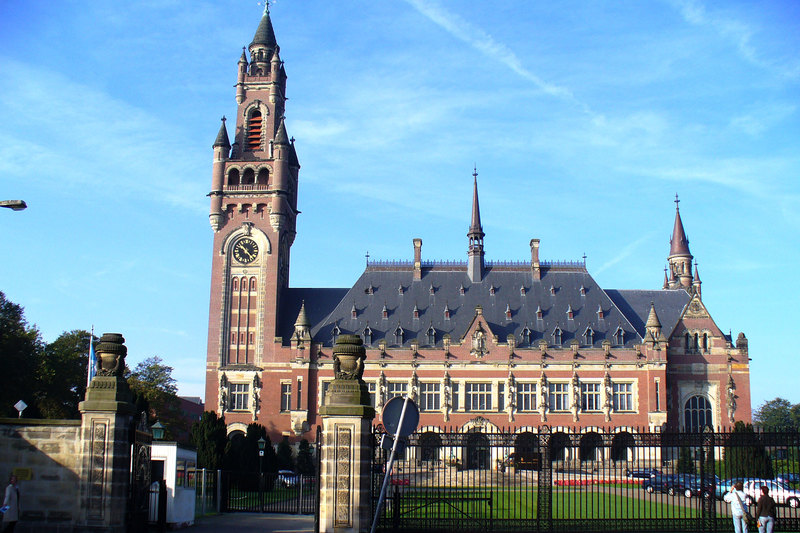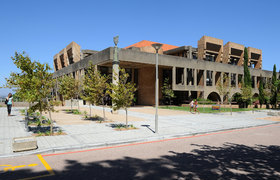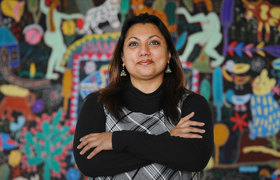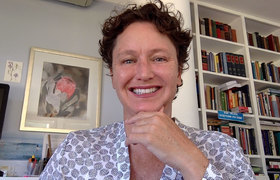UCT Law builds closer ties with the Permanent Court of Arbitration
02 September 2021 | Story Helen Swingler. Photo Karen Rustad Tölva/flickr. Read time 5 min.
A memorandum of understanding (MoU) signed between the Permanent Court of Arbitration (PCA), based in The Hague, the Netherlands, and the University of Cape Town (UCT) will see a PCA representative in South Africa drawn from UCT’s Faculty of Law, and the establishment of a fellowship programme for UCT graduates at The Hague.
Dean of Law Professor Danwood Chirwa recently signed the MoU with Ambassador Hugo Siblesz, the secretary‑general of the PCA in The Hague.
The PCA is an intergovernmental specialised arbitral institute established by the 1899 and 1907 Hague Conventions on the Pacific Settlement of International Disputes. The organisation specialises in the administration of arbitration, conciliation and other dispute‑resolution procedures among various combinations of states, state entities, intergovernmental organisations, and private parties. The PCA has 122 contracting parties, or governments. Its International Bureau is currently administering seven inter‑state disputes, 107 investor‑state arbitrations and many other contracts or agreements involving a state or other public entities.
The PCA also has a strong academic and research arm through its association with the International Council for Commercial Arbitration (ICCA), which produces key international arbitration publications.
The MoU was signed in the context of an existing Regional Facility Agreement between the PCA and the South African government, dating from 2007. This creates a legal regime for PCA proceedings in South Africa, comparable with that under PCA’s Headquarters Agreement with the Netherlands.
Consolidation and building relationships
In terms of the new MoU, the PCA’s representative to South Africa will be selected from among UCT law academics, teaching assistants and doctoral students. The Law faculty will also propose a postgraduate student to serve a one‑year fellowship at the PCA in The Hague, an invaluable opportunity to explore the world of international arbitration. The Law faculty’s Oliver Tambo Moot Court will also be made available for PCA arbitration and conciliation hearings and meetings.
The academic exchange opportunities will strengthen long‑standing ties between the PCA and UCT’s Law faculty and build the university’s expertise in international arbitration.
“UCT – as the premium university in Africa – is a natural partner for the PCA.”
“Against the background of what might be termed a renaissance of arbitral practice across the African continent, UCT – as the premium university in Africa – is a natural partner for the PCA,” said Ambassador Siblesz.
The MoU is the culmination of much behind‑the‑scenes work by Professor Debbie Collier, the head of the Department of Commercial Law, where the UCT/PCA activities will be based, and law alumnus Lise Bosman, PCA senior legal counsel. Bosman is also an adjunct professor in the Department of Commercial Law and has a well‑established relationship with UCT.
“Lise’s commitment to building capacity and expertise on the continent, and her contributions to the department over the years have been extraordinary,” said Professor Collier.
“The MoU is the next level, and we are delighted that Lise will play a more active role in developing staff and students in terms of the MoU, with activities that build on an already strong teaching and research presence in the field of commercial arbitration in the department.”
Bosman works mostly in the Netherlands. She completed her LLM in International Human Rights Law in the United States. Her teaching links with UCT date back to 2004, when she began teaching the Commercial Arbitration course in the faculty.
Bosman launched this course with Professor Dick Christie, and after his retirement, has been co‑teaching the course with UCT academics such as Professor Alan Rycroft and, most recently, Faadhil Adams.
“My area of expertise is commercial arbitration and investor‑state arbitration, with a special interest in arbitration in Africa,” said Bosman.
The second edition of her textbook, Arbitration in Africa: A Practitioner’s Handbook, is due to be published by Kluwer later in September.
Commitment to African capacity building
“We see this [MoU] as a fitting next step [in the relationship],” Bosman said.
“More broadly, it envisages academic and professional exchanges between UCT and the PCA, which we hope will contribute to capacity‑building for UCT and, at the same time, will enable the PCA to strengthen its activities in South Africa.
These activities include offering better services to cases being conducted under the auspices of the PCA involving African parties, Bosman added.
In the context of signing the MoU, the PCA has appointed Bosman to the new office of PCA Counsellor to the Secretary‑General, where she will supervise the implementation of the MoU.
Bosman sees the development deepening her commitment to promoting African arbitration and African expertise in arbitration. Towards this end, Bosman has also created internship and fellowship opportunities for UCT graduates with the ICCA in The Hague as part of the PCA.
Recent UCT graduates who have served internships or fellowships with the ICCA and the PCA include Susan Kimani (Kenya), Rhona Rwangyesi (Uganda) and Kathleen Mpofu (Zimbabwe).
Bosman was one of the founders of the African Arbitration Association in 2018 and now serves on the board. She was appointed to the Arbitration Foundation of South Africa Court on 1 June 2021.
 This work is licensed under a Creative Commons Attribution-NoDerivatives 4.0 International License.
This work is licensed under a Creative Commons Attribution-NoDerivatives 4.0 International License.
Please view the republishing articles page for more information.










